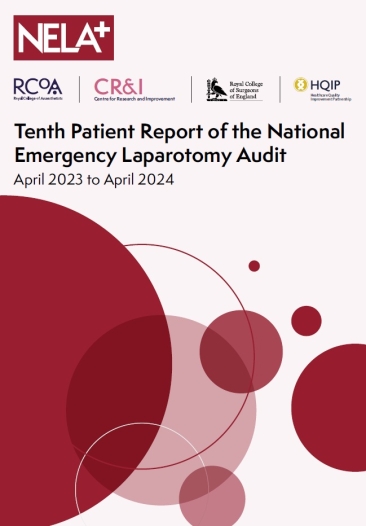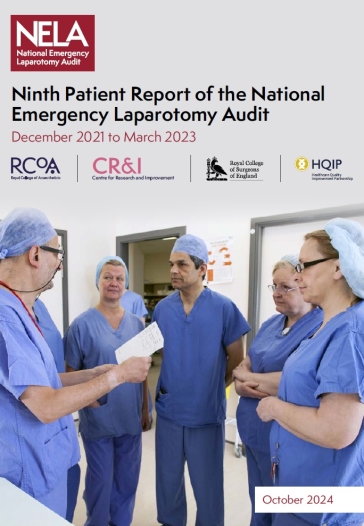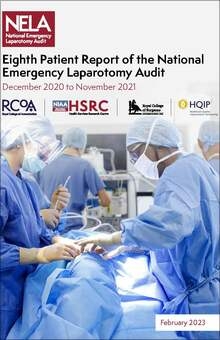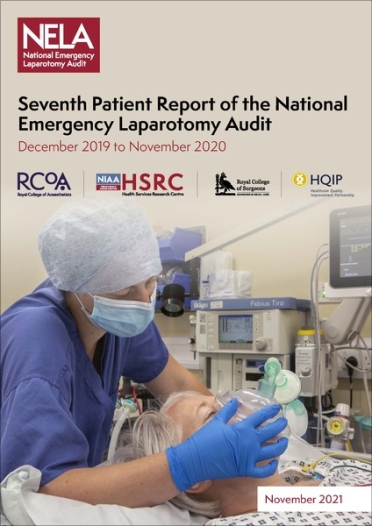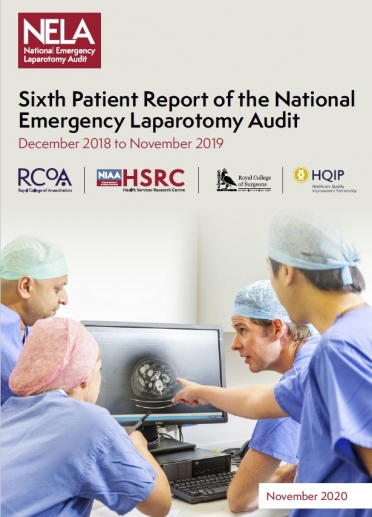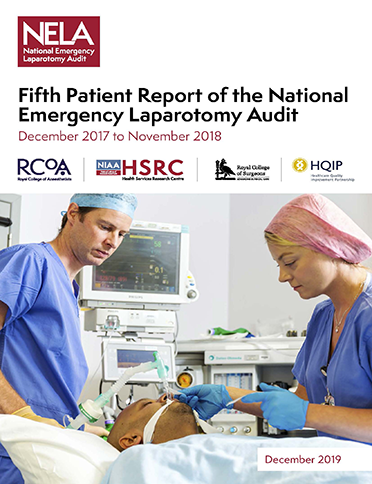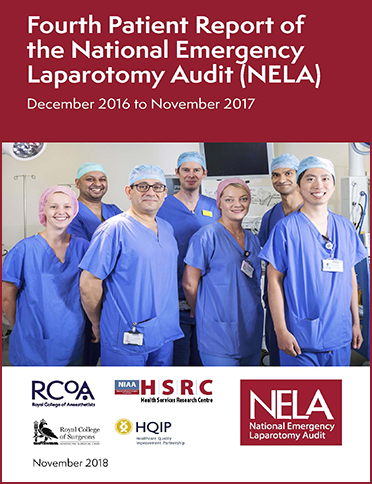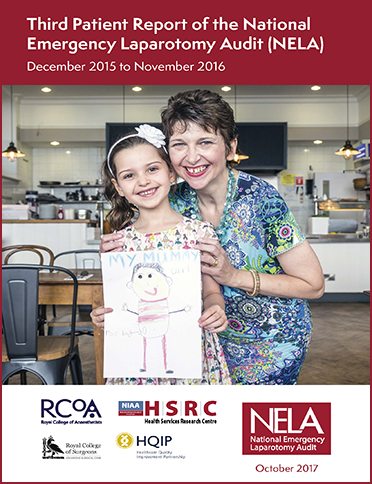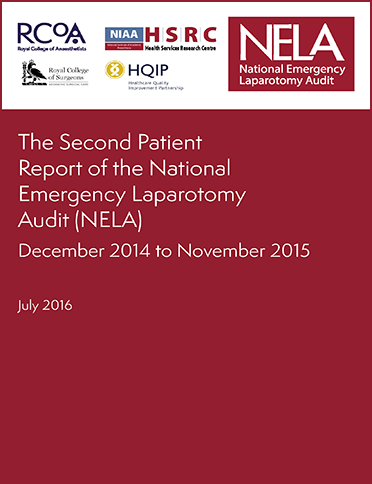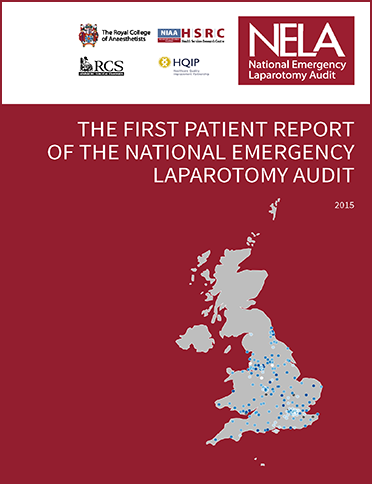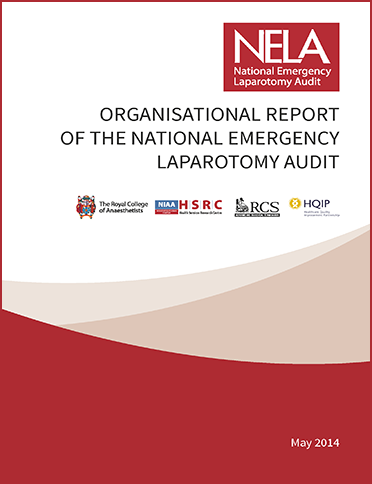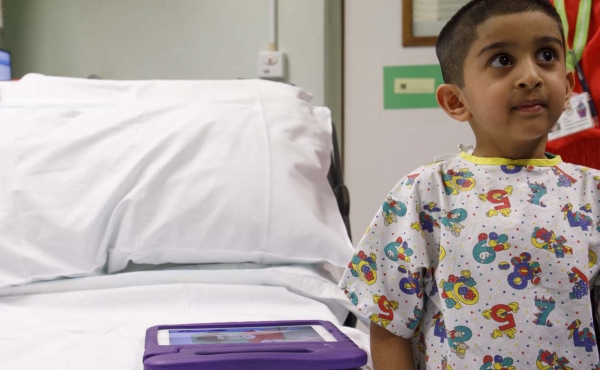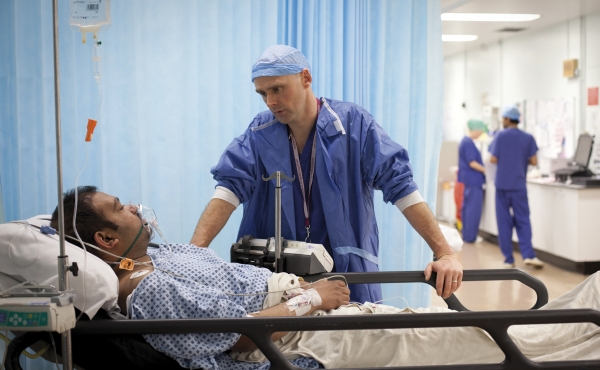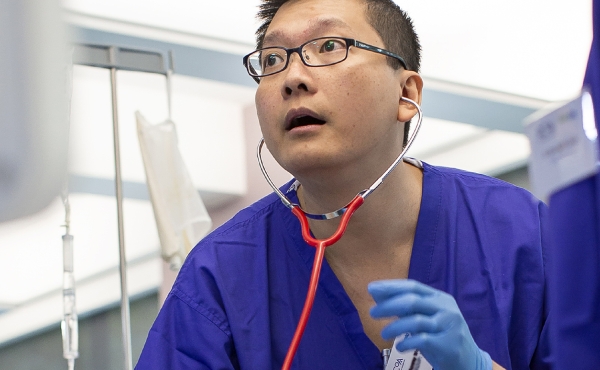National Emergency Laparotomy Audit (NELA)
NELA is a national clinical audit aiming to improve quality of care for emergency bowel surgery patients
The National Emergency Laparotomy Audit (NELA) was established to describe and compare inpatient care and outcomes of patients undergoing emergency laparotomy in England and Wales in order to promote quality improvement, by collecting high quality comparative data from all NHS providers. NELA now also includes a group of patients considered for emergency laparotomy, but who do not undergo the procedure--the NoLap cohort.

Who conducts NELA?
All NHS hospitals in England, Wales and Northern Ireland conducting emergency laparotomy surgery must report the data of these procedures to NELA. They are then audited against national standards.
Thousands of collaborators around the UK, including clinicians, research nurses and other hospital staff, input data into NELA every year. Without their invaluable contribution the audit could not function.
NELA is on ongoing audit we thank all our collaborators for their continued hard work during the data entry process of the audit.
NELA is being carried out by the Royal College of Anaesthetists Centre for Research and Improvement (CR&I), in conjunction with surgical and other key stakeholders.
NELA also partners with the Clinical Effectiveness Unit of the Royal College of Surgeons of England who provide important methodological and technical input.
Who funds NELA?
The audit has been commissioned by the Healthcare Quality Improvement Partnership (HQIP), funded by NHS England and the Welsh Government and it is part of the National Clinical Audit and Patient Outcomes Programme (NCAPOP).
NELA is on the list of national audits for inclusion in Trusts' Quality Accounts.
NELA reports
NELA releases a range of reports on the data we collect. Annual Reports are published once per year.
NELA Tenth Patient Report 2023-24
Report from the Tenth year of NELA data collection, published October 2025
NELA Ninth Patient Report 2021-23
Report from the ninth year of NELA data collection, published October 2024
NELA Eighth Patient Report 2020-21
Report from the Eighth year of NELA data collection, published February 2023
NELA Seventh Patient Report 2019-20
Report from the Seventh year of NELA data collection, published November 2021
NELA Sixth Patient Report 2018-19
Report from the Sixth year of NELA data collection, published November 2020
NELA Fifth Patient Report 2017-18
Report from the fifth year of NELA data collection, published December 2019
NELA Fourth Patient Report 2016-17
Report from the fourth year of NELA data collection, published November 2018
NELA Third Patient Report 2015-16
Report from the third year of NELA data collection, published October 2017
NELA Second Patient Report 2014-15
Report from the second year of NELA data collection, published July 2016
NELA First Patient Report 2013-14
Report from the first year of NELA data collection, published June 2015
Frequently Asked Questions
An emergency laparotomy is a major operation where the surgeon has to cut open the abdomen (stomach area). It is called "emergency" because it must be done very soon or even immediately and cannot wait until a later date. It might be carried out for several reasons including internal bleeding, perforation (burst), obstruction (a blockage) or infection. In many cases it might be the only option available in order for the patient to get better.
We want to improve the care that patients undergoing emergency surgery receive. To do this we will collect important information on how well your hospital is providing care to patients. We will then give hospitals all the valuable information we have obtained. This will highlight areas of their service where they are doing well, and areas in which they can improve. It will also allow hospitals to compare themselves with others all around the country. All hospitals in England, Wales and Northern Ireland that carry out emergency laparotomy are expected to participate in this audit.
We collect information about the care patients received whilst they are in hospital. This includes information about the investigations and treatment received, how long it took for different parts of treatment to be given, and whether a patient went to a critical care bed after surgery. The personal information we collect is name, date of birth, NHS number, postcode and sex. NELA patient data is submitted directly to NELA by clinical teams treating the patient or from the hospital records. NELA will not publish information that can enable individual patients to be identified.
By collecting and sharing this information, we are able to highlight areas where hospitals are doing well, and areas in which they can improve the quality of care for patients so that they can put plans in place to achieve this. It will also allow hospitals to compare themselves with others in England, Wales and Northern Ireland and in doing so improve the quality of care by sharing examples of good practice.
Full details of what is being collected, along with our legal basis for collecting data and our data protection and privacy policies, can be found on the NELA website.
Because some patients are very sick before and after they have had an emergency laparotomy, it would be very hard to ask all patients for their consent. It is important that we get information from all patients, not just those that are well enough to give consent. That's how we can provide an accurate overview of quality. It can be a distressing time for patients and their families, and asking them about this project at this time would not be their most important priority. NELA has an exemption under Section 251 of the NHS Act 2006 to collect patient data without consent.
Patients can choose to opt out of NELA. Opting out will not affect the care a patient receives. Please email info@nela.org.uk and put 'Patient request to opt-out' in the subject line. We will then contact the hospital to request that they do not enter your details into the audit. Alternatively, please notify a member of your local care team that you wish to opt out.
If your details have already been entered into the NELA database, your rights to access, change or remove your information may be more limited, as we need to manage your information in specific ways in order for research and reports to be reliable and accurate. If your data has not yet been used for analysis, it will be removed from the NELA database. If your data has already been used for analysis, we will not be able to remove information about you that we have already obtained and used. To safeguard your rights, we will use the minimum personally-identifiable information possible.
If you prefer you can also call the NELA Helpline on 020 7092 1683.
- All patients over the age of 18 years, having a general surgical emergency laparotomy, or considered for such surgery, in all NHS hospitals in England, Wales and Northern Ireland are eligible for inclusion and will be enrolled on a prospective basis. There is the potential to include other devolved nations should their funding bodies choose.
- The aim is to include all emergency gastrointestinal procedures on the stomach, large and small bowel, for conditions such as perforation, bleeding, abdominal abscess or obstruction, via open or laparoscopic approaches. Emergency laparotomies following elective surgical complications will also be included in NELA as will patients considered for emergency bowel surgery but who do not undergo the operation.
- Patients requiring vascular surgery, gynaecological surgery, surgery on the renal tract, and laparotomy following trauma will be excluded.
- If the original procedure was a non-elective laparotomy and this has been captured in the audit, then we will only be collecting a minimal amount of perioperative data for subsequent returns to theatre.
- If the original procedure was not included in the audit (e.g. because it was an elective procedure, or initially excluded from the audit), then the return to theatre will need to be included as it is a 'new' emergency laparotomy.
The NELA dataset is available online. NELA aims to collect only the minimum information required in order to provide risk adjusted comparisons against existing standards of care. We appreciate that the success of NELA depends on clinical engagement, and do not intend the dataset to be too onerous. No additional tests or investigations are required. All information collected is that normally available in the delivery of care to patients undergoing emergency laparotomy. Where possible, we link to existing databases to reduce the burden of data collection.
- Data collection takes place via the online NELA data collection portal.
- All data entry is carried out through the online data collection web-tool, which is accessible via PC, tablets and mobiles.
- This audit is a continuous prospective audit with real time data collection. It is expected that clinical teams enter the data real time rather than retrospectively.
- More than one person can enter data on a particular case.
- There will also be a paper form that you can download to use as assistance, but the data will have to be entered online.
- All sections need to be complete for the audit data to be submitted.
There is no subscription to be paid in order to participate in NELA; the data entry tool is provided at no cost to participating hospitals within England, Wales and Northern Ireland. All data is analysed by NELA and results provided to hospitals at no cost. Hospitals will need to cover the actual cost of data collection themselves.
However, because NELA also includes elements of quality improvement activity, there are benefits to trusts as the quality of care improves.
NELA is one of the NCAPOP (National Clinical Audit and Patient Outcomes Programme) audits funded by the Department of Health through HQIP. The NHS standard contract requires that organisations providing NHS care must participate in all relevant NCAPOP audits and enquiries. If providers do not participate in relevant NCAPOP audits they will be in breach of their contract with their commissioner, therefore any non-participation would need to be agreed with the commissioner and CQC as the regulator.
Further information is available on the HQIP website.
Would you like to find out more about NELA?
Visit the NELA website for the latest news and outputs from the audit, including our most recent reports.

Consultant Colorectal and General Surgeon at Salford Royal NHS Foundation Trust

Consultant Anaesthetist at Newcastle Upon Tyne NHS Foundation Trust.
Consultant Colorectal and General Surgeon at Stockport NHS Foundation Trust
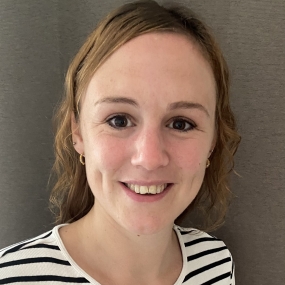
Advanced Clinical Practitioner at Northern Care Alliance NHS Foundation Trust.

